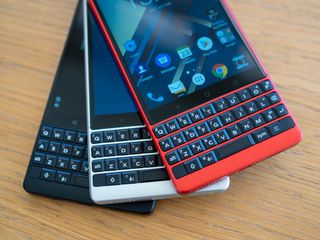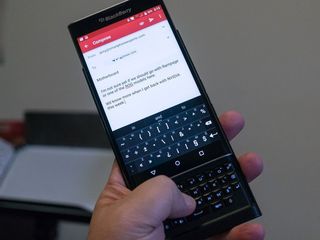Goodbye, BlackBerry, the zombie phone maker

I cut my smartphone teeth on a BlackBerry Curve. Plenty of others did, too. And on February 3, 2020, it all ended when TCL, the current licenser and manufacturer of BlackBerry Mobile phones, announced that it would stop selling any and all BlackBerry devices as of August 2020. That means you shouldn't buy one today, tomorrow, or ever.
Really, though, BlackBerry died when the company decided to sell off its hardware manufacturing business. Or it died when it tried too late to compete with Android and iOS with BlackBerry 10. Or it died when it released flawed products like the BlackBerry Storm. No matter how you look at it, BlackBerry as a smartphone company died long before today.
And I, for one, am going to miss it — a lot.
pic.twitter.com/jhcfVHjVqLpic.twitter.com/jhcfVHjVqL— BlackBerry Mobile (@BBMobile) February 3, 2020February 3, 2020
I had every Android-powered BlackBerry built by TCL and powered by the Waterloo company's own Android software, and despite all the flaws, I thought they all were good phones. Not just good Android phones or good BlackBerry phones, but good phones in general. Without BlackBerry, smartphones might be very different than they are today.
There never was a perfect BlackBerry. But there were some really good ones.
Each was flawed — hardware junkies were never going to like the specs, keyboard fans weren't going to want the touchscreen-only models, the KEY series was tall and awkward to use one-handed because of it, and the list goes on. But each also had qualities that made up for it, like BlackBerry Mobile's unique services and some security features that went above and beyond what Google had to offer.
More: I'm switching back to a Pixel because Android 10's privacy features are so important
I absolutely loved my KEY2. If BlackBerry Mobile had the same new permission and app restrictions of Android 10 (or TCL would have just updated the damn thing), I'd still be using it today. I'm one of the small minority of people who wanted a physical QWERTY keyboard and knew how to use it in conjunction with good predictive software. Yes, it was tall and weird before companies like Samsung figured out how to do tall and weird, and it was so top-heavy that one of those finger rings on the back was actually useful, but it made up for it with that keyboard. At least it did for me.
Be an expert in 5 minutes
Get the latest news from Android Central, your trusted companion in the world of Android

But it's easy to see that the keyboard wasn't enough to keep building them; very few people want actual buttons on the front of their phones nowadays. And that's the big issue — at least one of them. People buying phones in 2020 do not want QWERTY keyboards and do not care enough about mobile security to even look twice at anything with the name BlackBerry on it.
And BlackBerry was never going to build a phone with the latest specs, the best OLED display, amazing cameras, or any of the other things smartphone buyers in 2020 look for when they walk into a store with a fist full of cash. That's not the ultra-conservative BlackBerry way.
There was never going to be a phone with the best specs and the BlackBerry name on it.
I'm not bitter, I'm just a little sad. I don't expect a company to continue building products that don't sell, and I don't expect people to buy anything they don't like or care about. I'm just someone who has used a BlackBerry since the days of the "smart" BlackBerry 850 pager, when the company I worked for handed me one way back in 1999. Monochrome screen, a web browser that hardly worked, and access to your email and calendar at a time when nobody used email or had a web-based calendar.
I've had plenty of other models since — my favorite phone ever was not powered by Android but was a BlackBerry 8800 — and loved some, hated others, but had to leave once I tried a T-Mobile G1. I thought that was the day BlackBerry died for me until the Priv came along. I think it's still a great phone, no matter what anyone tries to tell me.
Great, but not great enough to keep the name BlackBerry alive. Goodbye BlackBerry. All of us will miss you even if some of us don't realize it.

Jerry is an amateur woodworker and struggling shade tree mechanic. There's nothing he can't take apart, but many things he can't reassemble. You'll find him writing and speaking his loud opinion on Android Central and occasionally on Twitter.
